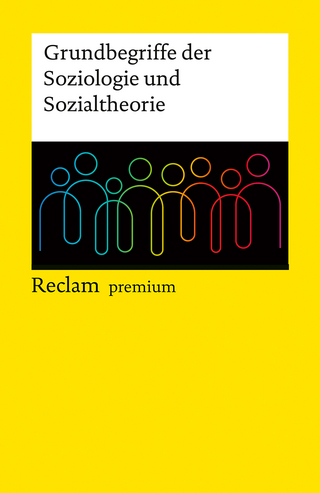
The Oxford Handbook of Max Weber
Oxford University Press Inc (Verlag)
978-0-19-067954-5 (ISBN)
Active at the time when the social sciences were founded, Max Weber's social theory contributed significantly to a wide range of fields and disciplines. Considering his prominence, it makes sense to take stock of the Weberian heritage and to explore the ways in which Weber's work and ideas have contributed to our understanding of the modern world. Using his work as a point of departure, The Oxford Handbook of Max Weber investigates the Weberian legacy today, identifying the enduring problems and themes associated with his thought that have contemporary significance: the nature of modern capitalism, neo-liberal global economic policy, nationalism, religion and secularization, threats to legality, the culture of modernity, bureaucratic rule and leadership, politics and ethics, the value of science, power and inequality. These problems are global in scope, and the Weberian approach has been used to address them in very different societies. Thus, the Handbook also features chapters on Europe, Turkey, Islam, Judaism, China, India, and international politics. The Handbook emphasizes the use and application of Weber's ideas. It offers a journey through the intellectual terrain that scholars continue to explore using the tools and perspectives of Weberian analysis. The essays explore how Weber's concepts, hypotheses, and perspectives have been applied in practice, and how they can be applied in the future in social inquiry, not only in Europe and North America, but globally. The volume is divided into six parts exploring, in turn: Capitalism in a Globalized World, Society and Social Structure, Politics and the State, Religion, Culture, and Science and Knowledge.
Edith Hanke is managing editor of the Max Weber-Gesamtausgabe at the Bavarian Academy of Sciences and Humanities in Munich. She worked on Leo Tolstoy and his significance for German cultural debate c. 1900. She edited Max Weber's "Sociology of Domination" for the Max Weber-Gesamtausgabe (I/22-4 and I/23) and is currently engaged in research on Max Weber's worldwide proliferation and reception. Lawrence A. Scaff is Professor Emeritus of Political Science at Wayne State University, Detroit. He is the author of Fleeing the Iron Cage (University of California Press, 1989), Max Weber in America (Princeton University Press, 2011; German translation Duncker & Humblot, 2013), and Weber and the Weberians (Palgrave Macmillan, 2014). Sam Whimster is Professor Emeritus of Sociology in the Global Policy Institute, London, and is a Fellow of the Academy of the Social Sciences. He is the editor of the journal Max Weber Studies and the author of Understanding Weber (Routledge, 2007; Portuguese translation 2007). He edited, with Hans Henrik Bruun, Max Weber's Collected Methodological Writings(Routledge, 2012). He is co-author of Federal Central Banks (Forum Press, 2018).
About the Editors
List of Contributors
Abbreviated Titles for Max Weber's Texts
Chronology of Max Weber's Life
Introduction
1. Introduction
Edith Hanke, Lawrence Scaff, and Sam Whimster
Part I. The Economy: Capitalism in a Globalized World
2. Economics and Society and the Fate of Liberal Capitalism
Sam Whimster
3. Max Weber's Analysis of Capitalism
Hinnerk Bruhns
4. Money, Credit, and Finance in Capitalism
Geoffrey Ingham
5. Law and the Development of Capitalism
Laura R. Ford
6. Is there a Future for Bourgeois Liberalism
Robert J. Antonio
Part II. Society and Social Structure
7. Contemporary Capitalism and The Distribution of Power in Society
John Scott
8. Weberian Social Theory: Rationalization in a Globalized World
Ralph Schroeder
9. Max Weber, Civil Society, and Partisanship
Sung Ho Kim
10. Nation, Nation-State, and Nationalism
John Breuilly
11. The Weberian City, Civil Society, and Turkish Social Thought
Lütfi Sunar
Part III: Politics and the State
12. The Modern State and its Monopoly on Violence
Andreas Anter
13. The Relevance of Weber's Conception and Typology of Herrschaft
Stefan Breuer
14. The Supra-National Dimension in Max Weber's Vision of Politics
Kari Palonen
15. Plebiscitary Politics and the Threats to Legality
Claudius Härpfer
16. Politics and Ethics, and the Ethic of Politics
Hans Henrik Bruun
Part IV: Religion
17. Max Weber's Ethics for the Modern World
Peter Ghosh
18. Max Weber and the Late Modernization of Catholicism
Rosario Forlenza and Bryan Turner
19. The "Disenchantment of the World" or Why We Can No Longer Use the Formula As Max Weber Might Have Intended
Kenichi Mishima
20. Weber's China: Confucianism and Vernacular
Scott Lash
21. Class, Caste, and Social Stratification in India: Weberian Legacy
Hira Singh
22. Including Islam
Stefan Leder
23. The Study of Ancient Israel and its Relevance for Contemporary Politics
Eduardo Weisz
Part V: Culture
24. The Rationalizations of Culture and Their Directions
Thomas Kemple
25. Max Weber and the Sociology of Music
Brandon Konoval
26. Contemporary Life Conduct and Existential Cultures
Barbara Thériault
27. From Occidental Rationalism to Multiple Modernities
Johann P. Arnason
28. Max Weber and the Idea of the Occident
Joshua Derman
Part VI: Science and Knowledge
29. Intellectuals, Scholars, and the Value of Science
Gangolf Hübinger
30. The Iron Cage in the Information Age
Jos C. N. Raadschelders
31. Causation, Value Judgments, Verstehen
Stephen P. Turner
32. Realism and Reality in Max Weber
Sérgio da Mata
| Erscheinungsdatum | 06.01.2020 |
|---|---|
| Reihe/Serie | Oxford Handbooks |
| Verlagsort | New York |
| Sprache | englisch |
| Maße | 249 x 183 mm |
| Gewicht | 1225 g |
| Themenwelt | Sozialwissenschaften ► Soziologie ► Allgemeines / Lexika |
| Sozialwissenschaften ► Soziologie ► Spezielle Soziologien | |
| Wirtschaft ► Allgemeines / Lexika | |
| Wirtschaft ► Volkswirtschaftslehre | |
| ISBN-10 | 0-19-067954-9 / 0190679549 |
| ISBN-13 | 978-0-19-067954-5 / 9780190679545 |
| Zustand | Neuware |
| Informationen gemäß Produktsicherheitsverordnung (GPSR) | |
| Haben Sie eine Frage zum Produkt? |
aus dem Bereich


